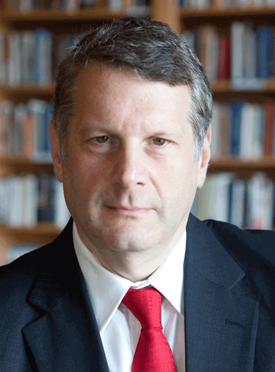


2019 Mather Lecture
Photos by iStock and courtesy of Myles Jackson November 01, 2019
Myles Jackson to give 2019 John R. Mather Visiting Scholars lecture
Myles Jackson, professor of the History of Science at the Institute for Advanced Study in Princeton, New Jersey, will give the 2019 John R. Mather Visiting Scholars Lecture at 6 p.m., Thursday, Nov. 7 in Mitchell Hall on the University of Delaware campus.

The talk, titled “Genes, Patents, and Race: The History of Science as a Bridge between Disciplines,” will focus on how the history of science can contribute to the understanding of two controversial aspects of biomedical research: gene patenting and race and genomics. Jackson will look at how gene patenting has challenged the content and conduct of scientific research, if it poses a threat to knowledge sharing and if someone’s race can be determined by her/his genome. If it can, what are the sociopolitical ramifications and what are they if it cannot?
Jackson’s talk will look at how historians of science can illustrate that neither gene patenting nor basing human classification on race is inevitable; there always have been alternatives. The event is free and open to the public, but registration is required. To register, visit the Mather Lecture webpage.
About the Mather Lecture
The John R. Mather Visiting Scholars Lecture honors the memory of John (Russ) Mather, who served as a professor of geography at UD from 1963 through 2003 and as chair of the Department of Geography from 1966 through 1989.
Sandra F. Mather established the lectureship to honor her late husband by enabling the department to host well-known scholars for the active exchange of ideas related to Mather's broad interests in climatology and geography.
The lecture will be hosted by the Department of Geography and Spatial Sciences, which is housed in UD’s College of Earth, Ocean and Environment.
About Myles Jackson
Myles W. Jackson is professor of the History of Science at the Institute for Advanced Study in Princeton, NJ. He received his doctorate in the history and philosophy of science from the University of Cambridge. He is the author of numerous articles on the history, philosophy, and sociology of science and technology, with a particular emphasis on the cultural history of 19th-century German physics and 20th- and 21st-century molecular biology. He has also written three books, all with MIT Press: The Genealogy of a Gene: Patents, HIV/AIDS, and Race; Harmonious Triads: Physicists, Musicians, and Instrument Makers in Nineteenth-Century Germany; and Spectrum of Belief: Joseph von Fraunhofer and the Craft of Precision Optics, which won the Paul Bunge Prize of the German Chemical Society for the best work on the history of scientific instruments and the Hans Sauer Prize for the best work on the history of inventors and inventions.
Jackson has co-edited a collection of essays entitled Music, Sound, and the Laboratory, with the University of Chicago Press, and he is the editor of Perspectives on Science: Gene Patenting with MIT Press. He is a member of the Erfurt Academy of Sciences, the German National Academy of Sciences and a corresponding member of the Académie Internationale d'Histoire des Science.
Jackson served as an expert for the American Civil Liberties Union in its lawsuit against Myriad Genetics on the BRCA 1 and 2 gene patents. He has received the Francis Bacon Prize in the History of Science and Technology from the California Institute of Technology. He was the Francis Bacon Visiting Professor of History of Science and Technology at Caltech. He also received the Reimar Lüst/Humboldt Prize of the Alexander von Humboldt Foundation and was named Bosch Public Policy Fellow of the American Academy in Berlin. He was a fellow at the Wissenschaftskolleg (Institute for Advanced Study) in Berlin. He is a research associate of the Max-Planck-Institute for the Science of Human History in Jena, Germany. He is currently working on an undergraduate text exploring the interrelationships between music, science, and technology from the eighteenth century to the present and is finishing up a monograph on the collaboration between musicians, scientists, and engineers during the 19th and 20th centuries.
Contact Us
Have a UDaily story idea?
Contact us at ocm@udel.edu
Members of the press
Contact us at 302-831-NEWS or visit the Media Relations website

